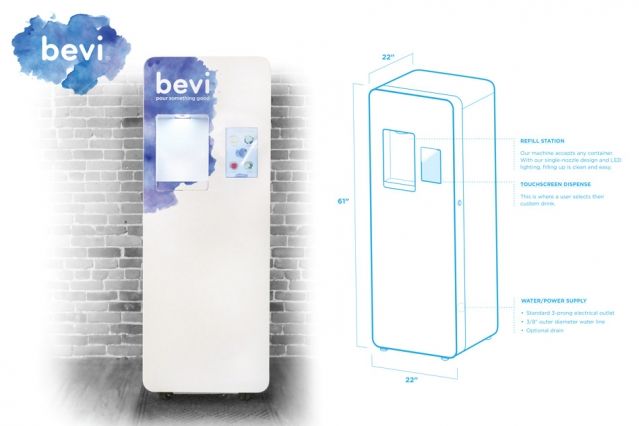Smart Beverage Machine Cuts the World's Use of Bottled Drinks
Published on by Water Network Research, Official research team of The Water Network in Technology
MIT spinout Bevi believes it can cut the world's use of bottled drinks with a smart beverage machine of the same name that delivers high quality, flavored water—straight from the tap.

Bevi is a smart beverage-dispensing machine — made with high-quality components inspired by medical devices — that filters and adds carbonation and customizable flavors to tap water in offices, gyms, and hotels. Credit: Bevi
Americans buy about 29 billion water bottles per year, and manufacturers use roughly 17 million barrels of crude oil to produce those bottles. One of every six water bottles used in the U.S. is recycled, and the rest are sent to landfills or end up littered on land and in rivers, lakes, and the ocean, where they can take hundreds of years to disintegrate. Delivering bottled beverages in trucks also produces a lot of carbon emissions.
Dubbed by some media as an "ecofriendly water cooler," Bevi is a smart beverage-dispensing machine—made with high-quality components inspired by medical devices—that filters and adds carbonation and customizable flavors to tap water in offices, gyms, and hotels.
According to the startup, Bevi machines located nationwide have saved more than 4 million plastic bottles from ending up in landfills, and each machine can potentially eliminate the use of 35,000 plastic bottles per year. The company is also shipping machines to Hong Kong and Singapore for pilot testing in the coming months.
As each Bevi machine is Internet-connected, the startup can leverage real-time data to provide proactive services and maintenance and gather insightful—and sometimes unexpected—data on beverage choice among demographic groups and across regions to refine its product.
Already in 600 locations in Boston, New York, and San Francisco, the Bevi machines are starting to see rapid adoption across all major U.S. cities thanks to a deal with major vending company Canteen signed in December.
Medical (device) quality beverages
Standing a slim five feet tall, the Bevi machines are hooked up to a tap water source. Water runs through the machine's custom filtration system. Consumers can select from flavors of still and sparkling water, such as unsweetened raspberry or lime, pomegranate, and kiwi-strawberry. A sliding scale on the touchscreen adjusts sweetness.
Bevi contains components of a traditional soda fountain. But in order to keep the beverage quality high to compete with the bottled-drink industry, Grundy says, the startup took inspiration from a surprising source—medical devices.
In early market research, the Bevi co-founders heard two major complaints about traditional soda fountain flavors. One, drinks from soda fountains often taste very different with each pour, due to different levels of carbonation, flavor dilution, and other aspects. Also, multiple drinks share the same nozzle, so the flavors will often blend.
A reason for these quality issues is that typical soda fountains use analog pumps that are manually adjusted to push concentrate into a stream of water with no real consistency. Over time, the pumps also shift in place and the quality of drinks changes.
The team decided, instead, to custom-make a beverage-mixing system using traditional components and peristaltic pumps typically used in medical devices such as dialysis machines, to digitally control doses. "When you're dispensing life-saving medications into a blood stream, you can't one day dispense a little too much, and another day too little. Standards are much higher," Grundy says.
By using Bevi's touchscreen sliding scale, consumers adjust the speed at which the peristaltic pumps dispense concentrate into the water, delivering an exact concentration of flavor.
Building Bevi
Bavi wants to disrupt the plastic-bottle supply chain, in which bottles are filled with tap water at bottling plants, sometimes mixed with ingredients, and then shipped around the world to consumers. "We thought that was a ridiculous supply chain," Grundy says. "It was obvious there were opportunity for efficiency."
The initial idea was to change consumer drinking behavior with better technology and design. This led to some "embarrassing" prototypes, Lee says. In one iteration, the team invented a "Redbox" for water, modifying a snack vending machine to dispense reusable water bottles that could be returned at any other machine, which would sanitize them for reuse. It was massive, cumbersome, and rather ugly.
Read more: Phys. org
Media
Taxonomy
- Water Access
- Technology
- Integrated Water Management
- Water Supply
- Drinking Water
- Impact
- Bottled Water